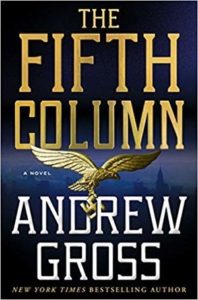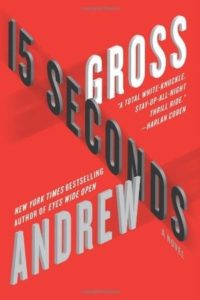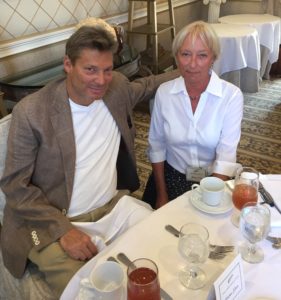
Bestselling author Andrew Gross has had some lucky breaks with his writing. But, he also took a few risks at the height of his career as a “suburban” thriller writer.
Most notably, his biggest break came when James Patterson invited him to be his co-author. He wrote five thrillers with James Patterson before writing eight thrillers alone.
His biggest risk? Switching from writing those bestselling suburban (his description) thrillers, like 15 Seconds, where he was writing about “people like you and me” to writing historical thrillers like The One Man and his most recent release, The Fifth Column.”
“I wanted to write books of bigger heft and larger themes,” he said last week in Palm Beach. “But the truth is, when you’re trying to hit the bestseller lists, you’re going after readers who read two to three books a year, so they go to a character they’re invested in. I have been all over the place.
“I haven’t wanted to do what’s safe but what I find stimulating. I don’t like writing the same things. I like being in flux, but it probably hasn’t always worked for me.”
10 Lessons To Learn
 In other words, Gross is the ideal bestselling author to talk about the lessons he’s learned during his decades-long career. Last week, he shared those lessons with aspiring writers and authors at a Palm Beach Writers Group lunch.
In other words, Gross is the ideal bestselling author to talk about the lessons he’s learned during his decades-long career. Last week, he shared those lessons with aspiring writers and authors at a Palm Beach Writers Group lunch.
While, seven of his ten lessons are great tips relating to the craft of writing and getting published, three are prompted by the harsh realities endemic in the publishing industry. So, let’s start with those since aspiring authors are so rarely told the cold, hard truth.
1. Modify Your Expectations
“One place expectations are not met is publishing,” said Gross. “You may write for 30 years and never get published. You have virtually no control once a manuscript leaves your hands. So, expectations are a source of disappointment.
“And, even if you get published, you’ll still have disappointments: You may go to a book signing and find only four readers there, or your novel may get only one printing of 2,000 copies.
“So, every step forward should be a reward.”
2. Writing Is A Contact Sport
“It’s not for those without fortitude, those who don’t have thick skins. As a writer you put yourself in a marketplace where your work is perpetually judged.
“Try to get a sense of why someone didn’t like your book. If you query six agents, and four ask to see your manuscript but then reject it, you obviously have a good idea which you’ve written poorly.
“However, ” he added, “if you’re constantly getting rejections , maybe you have to say, ‘this isn’t for me.'”
3. Find Happiness in the Craft
“You may never see your book (traditionally) published. But, maybe you’ll complete a family memoir, or you’ll self-publish and get 300-500 readers.
“Revel in that. Find your own epiphanies, and don’t focus on the disappointments.”
4. Put Yourself Out There
“Don’t hide in the isolated act of writing. Today, there’s unlimited access to agents, editors, and other authors. You can follow authors on FaceBook and Twitter, and for example you can write to me online.
“You’ve got to get out there, attend conferences, workshops and seminars where you can meet agents and pitch your work. Countless deals are made like that.
“Create a digital footprint (like a website or blog, or Instagram account) and connect with people, and build relationships with writers who are in the same situation.”
5. You Don’t Have To Write What You Know

Write what you know is advice that’s often given to aspiring authors, but said Gross, “I’ve never been a prisoner at Auschwitz; I’ve never bought opioids; I didn’t grow up on the Lower East Side. That’s what research is all about.
“So, write what you feel compelled to write and what you identify with.”
6. Outline
“I’m a strong believer in outlining. You must be in control of your story, not have the story in control of you. Have a strong sense of where you’re heading and get your arms around your story. Then, come to the computer and figure it out.
“Just because you outline, doesn’t mean you have to stick with it.”
7. Writing is a Process of Continuous Improvement
“No-one starts out as a Philip Roth. You get better at writing the more you do it. It’s not rocket science: it’s communication and storytelling. Even within one book, it gets better the more you loop back.”
Added Gross: “Some of my best reveals come in my second or third drafts.”
8. Time Is Your Best Editor

“When you think you’re finished, put down the manuscript, then come back to it two months later. You’ll see a different book.
“And, take the time to read it aloud. Learn to enjoy editing. It makes your work decent.”
9. Know What’s At Stake
“Know what is truly at stake in your story — and keep raising the stakes! But always understand what’s the true soul of your book. Find the heart of your book.” For example, as Gross explains in an interview on his website, The One Man is a nail-biting thriller in which a young Polish Jew who escaped Poland at the outbreak of World War II is asked to go back. He has 72 hours to find and rescue a scientist who is a prisoner in Auschwitz, but who is the only man who can help the Allies win the war. The true heart of the book, however, is the protagonist’s feeling of guilt and his need to make amends (feelings which any reader can understand /see lesson 10 below) because in escaping Poland he had left his parents and younger sister behind.
10. Find Spectacular in the Ordinary
“And, find the universal in the mundane. In other words, create characters in which readers see themselves. It’s hard to do that with a sense of purpose, but it should be the goal.”

Some great advice here 🙂
Yes.Agreed. Andy Gross is a really good, well-prepared speaker.
Great piece, Joanna.
Writing is definitely a contact sport, and a very thick skin is required to maintain sanity. Although I have received plenty of wonderful reviews, I was bothered by a lady who emailed me and told me she was deeply offended by the story and to get my mind out of the gutter. She went on to inform me that her son is a Boston firefighter and he assured her that they do not talk and act like the characters in my novel. He had to have been lying to her. I told her I was sad that the book offended her and offered a refund, but I explained that the scenes were authentic and due to the constant death and tragedy we deal with, black humor and profanity were our outlets. Can’t wait to hear about a publishing deal for your book.
That’s true Greg, you do have to be somewhat thick-skinned. Not everyone is going to love your novel, and sometimes they’ll even challenge you on your viewpoint. I think that’s okay. At least that reader read your book! It was nice of you to offer her a refund.